How I Saved My Father's Life (and Ruined Everything Else) Read online
Page 5
“Oh, yeah?” Cody said, close to tears. “Well, I think what he writes about is stupid and I wish he had disappeared in that dumb avalanche. I really do.”
“Oh, honey, I know you’re mad at him but you don’t wish that. You love Daddy,” Mom said.
“No, I don’t!” Cody yelled, and he ran from the bathroom and up the stairs, slamming his bedroom door loud.
“I hope you’re happy now, Madeline,” my mother said, following Cody.
“Have a nice date,” I said, in a fake sweet voice.
Her date was a man who made expensive drinking glasses. A glass sculptor, he called himself. His name was Jamie and he had silver hair that was way too long, hanging almost to his collarbone in dramatic waves. It was their third date. To me, his glasses looked warped, the way the windows on our house looked. They were rimmed in vivid colors and sat on different colored stems. On their first date, he had brought my mother two champagne glasses; one was deep orange and ruby, the other emerald green and cerulean. That’s what he called the colors. To me, they seemed like ordinary colors.
“The idea of it! Melting glass!” my mother had gushed, grinning all stupid while I thought about how ugly those glasses were. “Once,” she had babbled, “my ex-husband and I visited the Big Island of Hawaii and hiked through Volcano National Park to watch hot lava flow out of the volcano and into the ocean below. Of course, I realize now that one of the things fundamentally wrong with our marriage was that Scott enjoys such things: trekking in Nepal, rock climbing in the West, scuba diving, while I don’t like any of it.”
Even though it was true, I couldn’t believe she was spilling all of this personal stuff before they’d even left the house. Although my mother could ski, she avoided expert trails and stuck to bunny slopes. She did not like to swim to points too distant from the shore or venture any place too high above the ground. Like Cody, she was afraid of most things. I had thought for sure this guy wouldn’t stick around. But now they were going on their third date. Maybe he was even going to be my mother’s boyfriend.
When Mom returned to the bathroom, I was practicing putting on mascara. Every time the wand came near my eyes, I blinked them shut or poked myself so that now I had eyes like a raccoon with black mascara circles around them. “Who could kiss a guy with long stupid hair like that?” I asked
“Do you have a comment about every single thing?” Mom said. She was doing something weird with her hair, plopping globs of wax on it and making it stick up all over her head. She looked like someone who had been electrocuted. Ava used rosemary mint shampoo that came in a bottle shaped like waves, not the cheapo drugstore kind. Ava did not look electrocuted.
“What are you doing?” I asked my mother, disgusted.
“I am trying to have a life!” she shrieked.
With her hair like that and her eyes bulging the way they did when she got mad, she looked crazy. So crazy that I laughed.
And as soon as I laughed, she started to cry.
“This is dysfunctional,” I said. “I will be in therapy for the rest of my life!” Carolyn MacNamara from school went to therapy every Wednesday. She had dark circles under her eyes, pointy bones, and divorced parents.
I decided to stay in my room all night and write another letter to the Pope about my sainthood. Certainly someone who would put up with all of this all the time—a mother who wanted her hair to stand up like she’d been electrocuted, who laughed and cried without any reason, who shouted at her daughter—certainly all of these things would help my cause.
I was writing the letter when my father called. Of course, I listened in.
“It’s fine, Alice,” he was saying. “Take them to Italy.”
“What?” Mom said.
“That’s right,” Dad said, “because I worked on getting an assignment in Rome and the Times just gave me the okay. This way I’ll be there, too, and I can see my kids.”
“Fine!” Mom said. “If you have to one-up me every single time—”
“Don’t get paranoid,” Dad said.
I hung up quick. They were about to have a big fight and I didn’t want to hear. Besides, I was happy. Dad was going to be in Rome this summer. Italy was looking better and better.
One of the things my mother hated most about the divorce was putting us on that train to New York City once a month. She hated the way I always dressed in black for the trip to New York, how I pretended I actually lived in Manhattan and was on my way home instead of away from home. She hated the way that Cody always pressed his face to the window, distorting his features so that he appeared like something floating in a jar of formaldehyde. Until that phone rang five or six hours later, she was all nerves and jumpiness. I knew all this because she always told me, every single time.
But this time we were all boarding the train together. Cody and I were off to visit our father and Mom was on her way to a meeting and dinner with her editor, Jessica. She wore black, too: the pants she called Katherine Hepburn pants and a cashmere sweater, the one thing she’d splurged on for herself with her cookbook royalties. Her college roommate Melissa had told her that a girl needed something cashmere, the bigger the better. “Melissa knows these things,” my mother told me. “That’s dumb advice,” I said, just to be contrary.
She had on her Walnut Stain lipstick and she’d waxed her hair again. I decided to sit alone.
“You can sit alone only if I can see you,” my mother said.
So I took the seat in front of my mother and Cody.
“Isn’t this fun?” I heard her ask Cody. He was going to practice writing his numbers. He always made his 3s and 6s backward, but very neat.
“It is, Mommy,” he said. “I’m so glad you came with us. When you don’t come, Madeline won’t even talk to me. She just listens to her iPod and eats all the snacks.”
I rolled my eyes, even though they couldn’t see me. For one thing, I only had an old Shuffle to listen to. Everyone on the planet had iPods that played videos but I had this ancient thing. Also, I had no cell phone. Saints shouldn’t be so materialistic, I guess, but Bernadette didn’t have to keep up with technology.
“This time we’ll eat all the snacks,” my mother said, like that would bother me.
“Go ahead,” I said, sticking my face against the crack between the seats. “I hate those stupid rice cakes you always pack and I hate that bread with the cream cheese.”
“Good,” my mother said, leaning toward the crack. I could smell her coffee breath. “You can go to the diner car and get whatever it is you do like.”
“I want an Am on Rye,” I said. When she didn’t laugh, I said, “Get it? Am instead of ham because we’re on Amtrak. And Rye because we go through Rye, New York.”
“The pun,” she said, “is the lowest form of humor.”
She opened her book then. It was a mystery, set in England, her favorite thing to read. She always liked trying to solve the murder, and the foreign setting, which somehow made everything even more ominous and seemingly impossible to solve. She always used to tell me the plots of these novels and together we would try to figure out who the bad guy was. But lately, I’d lost interest.
“Want to know the setup?” she asked.
Even though a little part of me wanted to say yes, I leaned back in my seat and said, “No, thanks.”
“It’s a good one,” she said.
I looked out the window at all the trees whizzing by. “I’m not in the mood,” I said finally.
Her seat seemed to sigh as she settled herself into it for the four-hour ride to New York City and Dad.
At Penn Station, we made our way through a confusing stairway to the arrivals board where our father always met us. On the train, our mother had gone into the bathroom right before we arrived and put on some more lipstick and a big spray of Chanel Number 5. “For Jessica,” she’d said. “I need to look professional.”
After twenty minutes beneath the clattering arrivals board with no sign of my father, she asked me, “Is he always lat
e like this?” When she asked things like that I always felt like she was keeping notes somewhere of every single thing he did or didn’t do.
Cody said, “He’s always standing right here when we come up the escalator. He always has flowers for Madeline and a new Brio train for me.”
“What?” she said.
A few years ago, when she had wanted to get Cody a train set for Christmas, our father had called it an extravagance and refused.
“So you have a train set at Daddy’s?” she asked.
“Yeah. And it’s got a drawbridge and two tunnels and about fifteen hundred trains,” Cody said. “Where is Daddy, anyway?”
I was just about to strangle Cody when I saw the most beautiful sight: Ava Pomme. She was walking toward us, her hair shiny and her clothes perfect.
I waved like mad. “There’s Ava!”
Our mother spun around to look.
“Why’d he send her?” Cody mumbled.
Ava and our mother had never actually met. This was the first time I’d seen them side by side like this. Ava was a good five inches taller, with long rich brown hair falling over the collar of an oversize, below-the-knee camel cashmere coat, the sight of which made me embarrassed by my mother, standing there in her meager Old Navy pea coat. Ava wore black cigarette pants and boots with heels that my mother couldn’t walk on to save her life. She wore stupid shoes that she bought in Chinatown—fat black things with a strap across the instep. My mother looked short and dumpy. As Ava got closer, she reached out her hand, her legs so long and thin that all I could think of were deer running through meadows. My mother was more like a chipmunk.
“It’s a real pleasure,” Ava was saying.
“Where’s Daddy?” Cody demanded.
“His plane is late,” she said with a shrug. “He’s coming in from Chile and he has sweaters for all of us.”
She said Chee-lay as if Spanish were her true language. I practically swooned.
“Oh, goodie,” my mother said sarcastically. “Even me?”
Ava laughed. “Maybe. You can never tell what Scott might do. So,” Ava said to me, “let’s get going, shall we? Marthe has the baby and I promised we’d come right back.” She turned her attention back to Mom. “Marthe’s our nanny. Honestly, she runs our life. We wouldn’t be able to get out of bed in the morning without her.”
I adored Marthe, even though I never understood anything she was saying. She smelled like sweet cinnamon buns, the kind my mother used to make for breakfast on snowy mornings. I missed those mornings, Mom and Dad bustling around the kitchen and Cody and me drawing pictures at the kitchen table. Thinking about it, I can almost smell the strong coffee brewing and the rich cinnamon of those pastries.
“Do you want to share a cab downtown?” Ava was asking Mom.
“No, thanks,” my mother said.
I wondered if she had imagined sharing a cab downtown with Dad while she was in the bathroom on the train, foolishly putting on lipstick and perfume. I found myself wondering what Dad would do if he saw her right now, smelling good and looking almost hopeful. Deep down I knew he would do absolutely nothing. He was married to Ava now. I kissed Mom as fast as I could, gulping a big dose of Chanel Number 5. It was weird standing between Mom and Ava. I just wanted to get out of there.
Cody clung to her leg whispering, “Mama, Mama, don’t leave me like this.”
I disentangled him. I wanted to get away from my mother and melt into life with my father and Ava. We only had the weekend. Every minute counted.
“Good-bye!” I shouted to her, dragging Cody along by the elbow. Even his sniffling couldn’t ruin my mood. I felt lighthearted and happy.
I linked arms with Ava. Everyone who saw us would think she was my mother. “Tell me everything you and Daddy have done since I was here last.” I hoped my mother saw me walking out like this, arm in arm with Ava Pomme, the Tart Lady.
Chapter Four
DEAD MOTHERS
Marie Taglioni, the famous Italian ballerina, was so famous that they named stuff after her. In Russia, for example, there were Taglioni caramels and cakes and even hairdos. After her last performance in 1842, someone bought her ballet shoes for 200 rubles, cooked them, and served them with a special sauce. Then her fans ate them! That sounds like something people would do for a saint, doesn’t it?
Marie Taglioni was also very plain-looking. Her teacher in France said, “Will that little hunchback ever learn how to dance?” And then Marie Taglioni became the perfect image of a ballerina. Standing en pointe in her white tutu with her hair parted in the middle and pulled back, wearing a floral wreath. So certainly, I, Madeline Vandermeer, could take it when my gum-chewing second-rate ballet teacher Misty Glenn yelled at me during class: “Madeline, what are you, a chicken? You’re holding your arms like you have chicken wings!” If that wasn’t bad enough, then Misty Glenn said, “Cluck! Cluck!” and a bunch of girls laughed.
Not Demi Demilakis, a girl in my class. She looked at me with pity. She has these really bulgy eyes, like a frog. Like any minute they might pop right out of her head. She’d just moved here from Cleveland, of all places. I asked her once after class if she knew my old friend Rose Malone and those eyes of her went all bulgy and she said, “She was in my grade at Gilmore!” Demi missed Cleveland. Her father used to take her surfing on polluted Lake Erie and she had her birthday party at the Rock and Roll Hall of Fame. Now she’s just a new kid, like me.
Still, I didn’t want her pity. When she looked at me that way, I glared at her hard. She shrugged and went back to her lazy arabesques. The girl in front of me was wearing a tie-dyed leotard. Madame would have made her leave class. And the girl in front of her was barefoot. Leave it to my mother to find this place.
“Nice extension!” Misty Glenn said.
It took me a minute to realize she was talking to me. She yelled everything, like a gym teacher.
I knew I had a nice extension. I didn’t need Misty Glenn to tell me that. One thing was certain, I was suffering. Sainthood had to be right around the corner.
The next day at school, Mai Mai Fan almost knocked me down in the hallway. She was carrying her cello case and heading for the front door.
“Sorry, Madeline,” she called over her shoulder. “I can see you are miserable, but I don’t want to miss my bus.”
“What bus?” I asked her. She didn’t stop, of course. Mai Mai never stopped.
I hurried to catch up with her. “What bus?” I said again.
“My bus to Boston. I have my advanced cello lesson there every Monday afternoon. At the Conservatory,” she added. “No one here can teach me anything anymore.”
If some kids said these very words, they would be bragging. But not Mai Mai. Her life was a giant list of accomplishments. That’s really all she had to talk about. She was excellent at everything.
“Do you take that bus alone?” I asked her.
“Of course. I get off at South Station and get on the Red Line,” she said.
She told me every step she took, but I stopped listening. If Mai Mai Fan, age eleven—she had skipped a grade—could take a bus and a subway to Boston and back by herself, then surely so could I.
“Now you look happy,” Mai Mai said. “Good.”
She ran out the door, and disappeared.
“No way,” my mother said. “No way.”
“Mai Mai Fan—” I started, but my mother looked at me all puzzled.
“What?” she said.
“Mai Mai Fan is a who, not a what,” I told her. When your daughter has only a couple of friends, you would think a mother might remember their names.
“The chess champion?” my mother said.
“She is only eleven and she takes the bus by herself every Monday.”
We were on our way home from school. I hadn’t wasted any time. Returning to Madame’s class was too important.
“I am the king of the air,” Cody said from the backseat. He had on a stupid paper crown that all the kindergarten kids had made
that day.
“Then you are the king of exactly nothing,” I told him. “Air is nothing.”
My mother had already moved on in topics of conversation. “I have to stop at Whole Foods and see if they carry pomegranate molasses. Jessica says everything is pomegranate this year.”
“If air is nothing, then why do we say good night to it in Goodnight Moon?” Cody said. I could tell he was close to breaking down, and that made me feel slightly better.
With this renewed strength of purpose I said, “Maybe I’ll just go and live with Daddy and go to the American Ballet Theatre school.” For some peculiar reason, when I said this I felt queasy, not elated.
“She wants me to do an entire pomegranate menu,” my mother said with disgust. “As if kids like pomegranates.”
I looked at her. I had just threatened to leave home and all she could talk about were pomegranates?
Cody was starting a full-fledged meltdown. “Are those the little orange things where we have to eat the skin?” he was saying, all panicked.
“No,” I said, my voice as sweet as pomegranate molasses, “they’re the red things where you eat just the seeds.”
“Why do you act this way?” my mother said.
“They are the ones where you eat the seeds,” I told her. Then I looked out the window. We were driving down Waterman Street and it was clogged with students from Brown University.
“And by the way,” I said, “were you even listening to me? I said if you didn’t let me go to Boston on the bus by myself then I would go and live with Daddy.” That queasy feeling came right back, as soon as I said those words.
My mother stopped the car, right there in the middle of Waterman Street. “Isn’t life strange?” she said.
The car behind us honked its horn, but she just sat there, shaking her head.

 Kitchen Yarns
Kitchen Yarns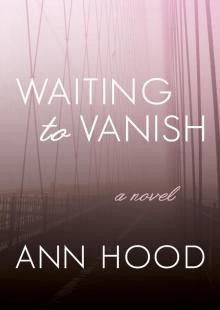 Waiting to Vanish
Waiting to Vanish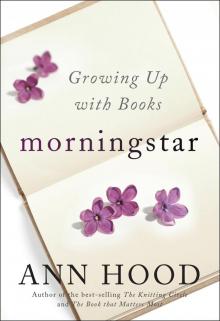 Morningstar
Morningstar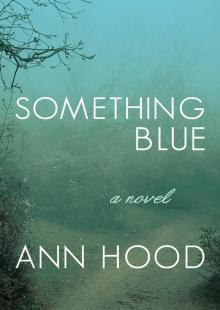 Something Blue
Something Blue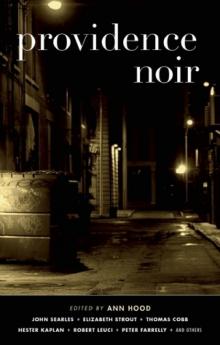 Providence Noir
Providence Noir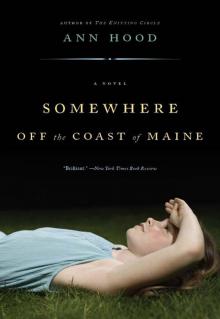 Somewhere Off the Coast of Maine
Somewhere Off the Coast of Maine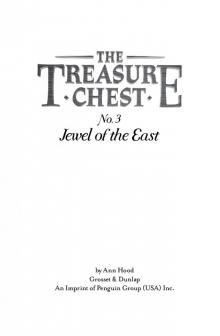 Jewel of the East
Jewel of the East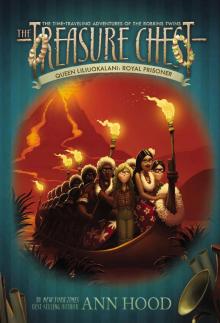 Queen Liliuokalani: Royal Prisoner
Queen Liliuokalani: Royal Prisoner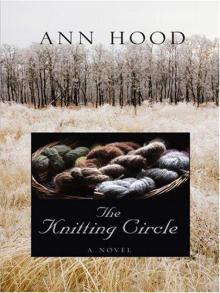 The Knitting Circle
The Knitting Circle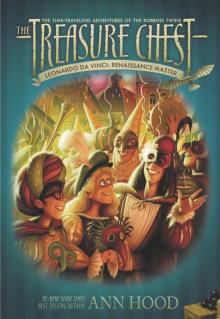 Leonardo da Vinci: Renaissance Master
Leonardo da Vinci: Renaissance Master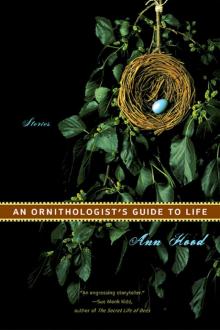 An Ornithologist's Guide to Life
An Ornithologist's Guide to Life The Red Thread
The Red Thread She Loves You (Yeah, Yeah, Yeah)
She Loves You (Yeah, Yeah, Yeah)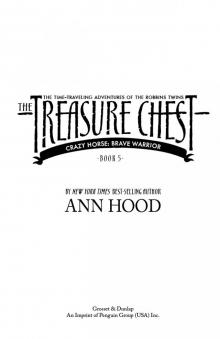 Brave Warrior
Brave Warrior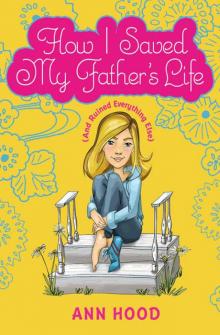 How I Saved My Father's Life (and Ruined Everything Else)
How I Saved My Father's Life (and Ruined Everything Else)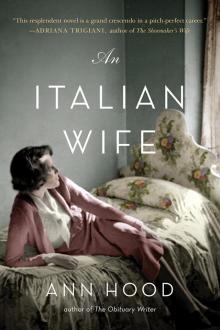 An Italian Wife
An Italian Wife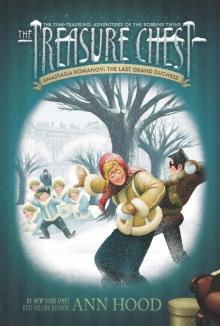 Anastasia Romanov: The Last Grand Duchess #10
Anastasia Romanov: The Last Grand Duchess #10 Prince of Air
Prince of Air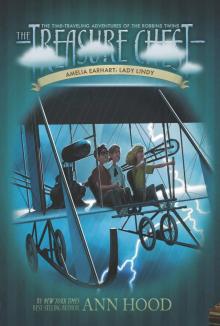 Amelia Earhart: Lady Lindy
Amelia Earhart: Lady Lindy Places to Stay the Night
Places to Stay the Night Little Lion
Little Lion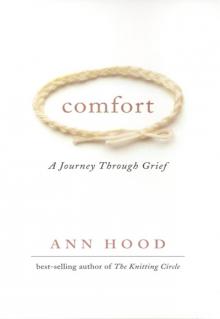 Comfort
Comfort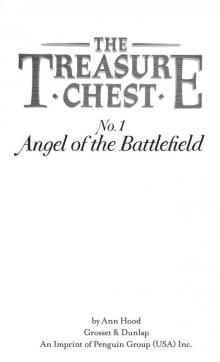 Angel of the Battlefield
Angel of the Battlefield